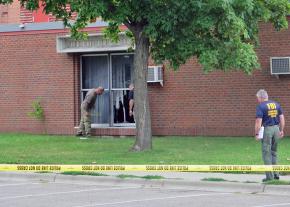Minneapolis rallies around a bombed mosque
Trump's deafening silence about the attack on a Minnesota mosque is a stark contrast to the solidarity of community members, write and .
MORE THAN 1,000 people rallied on August 8 to show their support for a suburban Minneapolis mosque that was bombed on the morning of Saturday, August 5, as people prepared for morning prayers. More than 20 speakers addressed the crowd, which was made up of Muslims, Christians and Jews; young and old; and people of all races.
The bomb shook the entire building that houses the Dar al-Farooq Islamic Center and rattled homes throughout the neighborhood around 5 a.m. in Bloomington, Minnesota, which lies just south of Minneapolis.
"Today is a day to join hands, reject hate and reaffirm humanity," Mohamed Omar, the executive director of Dar al-Farooq, told the crowd. "We thank God Almighty for blessing us with good neighbors. We are one Minnesota."
Trevin Miller, who lives across the street from the mosque, was awoken by the blast. "I thought maybe somebody drove through our house or something," said Miller. "I felt it on my insides."
Eyewitnesses saw a man drive away in a truck after hearing the window of the imam's office shatter. The power of the blast, which did significant damage to the imam's office but fortunately did not injure any of the dozen or so people gathering elsewhere in the building for the morning prayer, shocked the mosque's congregants.

But people felt joy at the outpouring of support that followed three days later.
"We thank you from the deepest part of our heart," said Abdulahi Farah of Dar al-Farooq, as he described the many neighbors who stopped by with cookies, flower and well wishes in the days after the attack.
BUT WHILE the community rallied around the mosque, there was a conspicuous silence from Donald Trump about the attack, prompting many faith leaders, politicians and people on social media to call on him to condemn the attack on the mosque.
"If a (predominantly white) church or other house of worship were firebombed over the weekend, Trump would've commented by now," tweeted Imraan Siddiqi. Another Twitter user wrote: "The only thing missing from Trump's denunciation of the attack on a Minnesota mosque was a denunciation of the attack on a Minnesota mosque."
Asked by a reporter about why Trump hadn't yet commented, Sebastian Gorka, one of Trump's national security advisors, suggested that the attack may have been "propagated by the left" in order to appear as a hate crime.
"Silence on the part of public officials at the national level only serves to empower Islamophobes," Ibrahim Hooper, a spokesman for the Council on American-Islamic Relations, said in a statement calling for Trump to condemn the attack.
The prevalence of Islamophobia in the American political establishment and in the mainstream media explains the double standard in how acts of violence are represented. What politicians and the media are willing to label terrorism--and what they are not--is intrinsically linked to the interests of the foreign policy establishment and U.S. imperialism.
That's why, despite how obvious it is to most people that the attack on the Dar Al-Farooq mosque was an act of racist terror, many media sources have yet to actually call it that. The idea of an American carrying out a terrorist attack on Muslims is so contrary to the Islamophobia that structures the media narrative that many accounts seemed to scramble to find other ways to describe it.
It even took liberal Minnesota Gov. Mark Dayton more than 24 hours to publicly label the attack an act of terrorism.
But the Trump administration's silence on the attack only served to stiffen the resolve of those who rallied in support of the mosque. "This is my community," said Bloomington resident Donna Campbell. "I'm not okay with what happened here. I'm here to support our neighbors."


